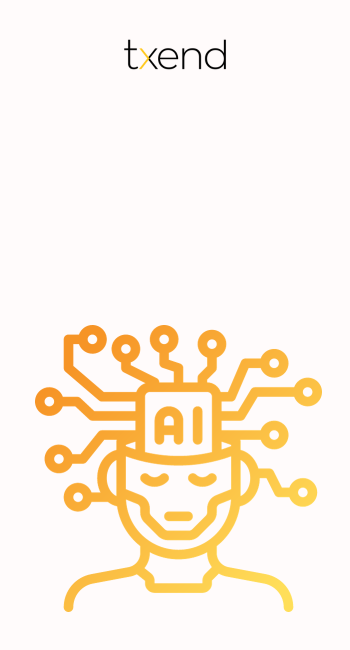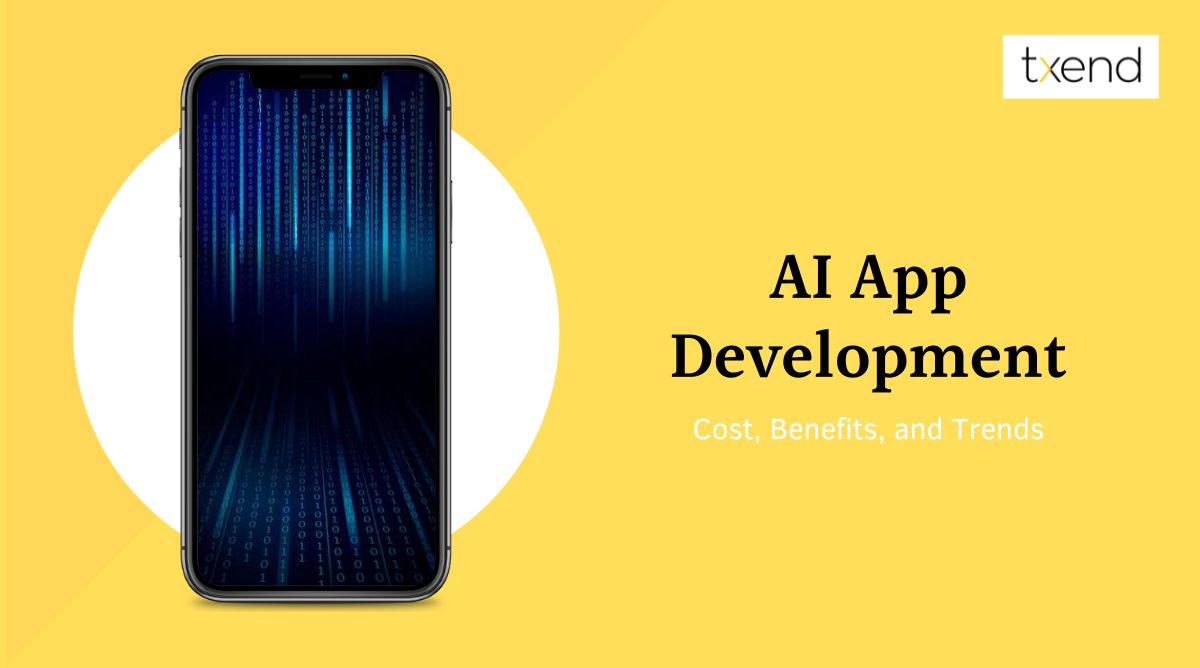Artificial intelligence (AI) is rapidly transforming the way we live and work. AI-powered applications are already being used in a wide range of industries, from healthcare to finance to manufacturing.
And as AI technology continues to advance, we can expect to see even more innovative and disruptive applications emerge in the years to come.
One of the most exciting areas of AI development is the creation of AI-powered mobile apps. AI mobile apps can be used to solve a wide range of problems, from improving customer service to automating tasks to enhancing the user experience.
AI App Development
This article will discuss the latest trends in AI app development and provide tips on how to find the right developers to build your AI app. We will also cover the cost of AI app development and discuss the market share of AI apps.
Trends in AI App Development
Some of the key trends in AI app development include:
Increased use of machine learning (ML):
ML is a type of AI that allows computers to learn without being explicitly programmed. ML is being used to develop AI apps that can perform tasks such as image recognition, natural language processing, and fraud detection.
Growth of conversational AI:
Conversational AI is a type of AI that allows computers to understand and respond to human language. Conversational AI is being used to develop AI-powered chatbots and virtual assistants that can provide customer service, answer questions, and complete tasks.

Emergence of new AI platforms:
A number of new AI platforms have emerged in recent years, making it easier for developers to build AI apps. These platforms provide developers with access to pre-trained AI models and tools, which can significantly reduce the time and cost of AI app development.
Market Share of AI Apps
The market share of AI apps is growing rapidly. According to a report by Statista, the global AI app market is expected to reach $1.5 trillion by 2027.
The growth of the AI app market is being driven by a number of factors, including the increasing adoption of AI by businesses, the growing popularity of AI-powered devices, and the increasing availability of AI development tools and resources.
Key Takeaways
- AI app development trends: personalization, NLP advancements, AI-driven automation, enhanced security, and integration of advanced AI features.
- AI apps occupy a significant market share, rapidly growing due to increased demand for personalized and efficient digital solutions.
- Early mobile app development involves idea conceptualization, market analysis, and initial design planning, setting the foundation for development.
- AI streamlines tasks, enhances personalization, and improves user engagement, propelling the development of intelligent, user-centric mobile applications.
- AI-integrated apps in business enhance customer engagement, streamline operations, and facilitate data-driven decision-making, fostering competitive advantages.
Early stages of mobile app development
The early stages of mobile app development in the USA are characterized by a number of key trends:
Focus on ideation and research:
The early stages of mobile app development are all about coming up with a great idea for an app and conducting research to validate the idea. This includes understanding the target market, identifying the key features of the app, and researching the competition.
Rapid prototyping and design:
Once a solid idea for an app has been developed, the next step is to create a prototype. This is a working model of the app that can be used to test the idea and get feedback from potential users. The prototype can also be used to design the user interface and user experience of the app.
Agile development methodology:
The agile development methodology is a popular approach to mobile app development. Agile development is characterized by an iterative approach to development, with frequent releases of the app.
This allows the development team to get feedback from users early and often, and to make changes to the app as needed.
In the USA, the early stages of mobile app development are often funded by venture capitalists or angel investors. These investors are looking to invest in innovative app ideas with the potential to generate a high return on investment.
Here are some tips for successfully navigating the early stages of mobile app development in the USA:
- Have a great idea: The most important thing is to have a great idea for an app. This is the foundation of your entire project, so it’s important to take the time to develop a well-defined idea.
- Do your research: Once you have an idea, it’s important to do your research to validate the idea. This includes understanding the target market, identifying the key features of the app, and researching the competition.
- Build a strong team: You’ll need to build a strong team to help you develop and market your app. This team should include experienced developers, designers, and marketers.
- Secure funding: You’ll need to secure funding to develop and market your app. This can be done through venture capital, angel investors, or crowdfunding.
- Get feedback: It’s important to get feedback from users early and often. This feedback can help you to improve your app and make sure that it meets the needs of your target market.
If you’re thinking about developing a mobile app in the USA, the early stages can be the most challenging. But by following the tips above, you can increase your chances of success.
Role of AI in Mobile App Development
AI is playing an increasingly important role in mobile app development in the US. AI-powered apps are already being used in a wide range of industries, from healthcare to finance to retail.
And as AI technology continues to advance, we can expect to see even more innovative and disruptive AI-powered apps emerge in the years to come.
Here are some of the ways that AI is being used in mobile app development in the US:
- Personalization: AI can be used to personalize the user experience of mobile apps. For example, AI-powered recommendation engines can suggest products, content, and services to users based on their interests and past behavior.
- Automation: AI can be used to automate repetitive tasks in mobile apps. For example, AI-powered chatbots can answer customer questions and provide customer service.
- Security: AI can be used to improve the security of mobile apps. For example, AI-powered fraud detection systems can detect and prevent fraudulent transactions.
- Analytics: AI can be used to analyze data from mobile apps to gain valuable insights. For example, AI-powered analytics can be used to understand user behavior and track the performance of mobile apps.

Overall, AI is transforming the way that mobile apps are developed and used in the US. AI-powered apps are more personalized, automated, secure, and insightful than traditional mobile apps. As a result, AI-powered apps are becoming increasingly popular among businesses and consumers alike.
Here are some examples of AI-powered mobile apps that are popular in the US:
- Google Maps: Google Maps uses AI to provide users with real-time traffic information and directions.
- Netflix: Netflix uses AI to recommend movies and TV shows to users based on their viewing history.
- Amazon: Amazon uses AI to recommend products to users based on their past purchases and browsing behavior.
- Siri: Siri uses AI to understand and respond to natural language commands.
- Face ID: Face ID uses AI to recognize faces and unlock devices.
These are just a few examples of the many ways that AI is being used in mobile app development in the US. As AI technology continues to advance, we can expect to see even more innovative and disruptive AI-powered apps emerge in the years to come.
Step-by-Step AI Mobile App Development
Certainly, developing an AI mobile application involves several steps. Here’s a step-by-step guide to AI mobile app development in the United States:
Step 1: Conceptualization and Planning
- Identify the Problem: Define the specific issue your AI mobile app will solve, ensuring it aligns with market demand and user needs.
- Set Clear Objectives: Establish precise goals for your AI mobile app, such as improving user experience, enhancing efficiency, or providing innovative solutions.
- Market Research: Conduct thorough market research to understand the current landscape, identify competitors, and recognize potential challenges or opportunities.
Step 2: Design and Prototyping
- Wireframing and UI/UX Design: Create a basic layout and wireframe for your AI mobile app, focusing on an intuitive user interface and smooth user experience.
- Prototype Development: Build a prototype to visualize the app’s functionality and design. Gather feedback from potential users or stakeholders to refine the prototype.
Step 3: Development
- Choose Appropriate Technology Stack: Select suitable programming languages, frameworks, and tools that align with your project requirements and goals.
- Data Collection and Preparation: Gather relevant data sets to train and feed your AI algorithms. Ensure the data is accurate, clean, and comprehensive to achieve optimal AI functionality.
- Implement AI Algorithms: Integrate AI algorithms like machine learning, natural language processing, or computer vision, depending on the specific features and functionalities of your AI mobile app.
Step 4: Testing
- Functional Testing: Validate the functionalities of your AI mobile app to ensure they perform as expected.
- Performance Testing: Evaluate the app’s performance under various conditions to guarantee its stability and responsiveness.
- User Acceptance Testing (UAT): Involve potential users in testing to gather feedback on usability and overall user satisfaction.

Step 5: Deployment and Launch
- Submission to App Stores: Adhere to the guidelines of various app stores, such as Google Play Store and Apple App Store, for successful app submission.
- Monitoring and Maintenance: Continuously monitor the app’s performance and user feedback post-launch. Implement necessary updates, bug fixes, and feature enhancements to ensure a seamless user experience.
Step 6: Marketing and User Engagement
- Develop a Marketing Strategy: Create a comprehensive marketing plan to promote your AI mobile app, focusing on its unique features and benefits.
- User Engagement and Feedback: Encourage user engagement through various channels, such as in-app feedback, social media, and community forums, to understand user preferences and improve the app’s performance accordingly.
By following these steps, you can effectively navigate the intricate process of AI mobile app development in the United States and deliver a robust and user-friendly application that meets market demands and user expectations.
Why Develop AI-Integrated Apps in Business?
Developing AI-integrated applications in the business sector in the US offers numerous advantages, empowering companies to streamline operations, enhance customer experiences, and gain a competitive edge.
Here are some compelling reasons, along with practical examples:
Enhanced Customer Engagement and Personalization
Integrating AI into business apps enables personalized customer experiences, leading to improved engagement and satisfaction.
For instance, e-commerce giants like Amazon use AI-powered recommendation engines to offer personalized product suggestions to customers, enhancing their overall shopping experience.
Streamlined Operations and Increased Efficiency
AI-integrated business apps automate routine tasks, optimize processes, and reduce manual intervention, resulting in increased operational efficiency.
Companies like UPS utilize AI algorithms to optimize delivery routes, reducing delivery times and improving overall logistics management.
Data-Driven Decision Making
AI-driven business apps can analyze vast amounts of data quickly, enabling informed and data-driven decision-making.
For example, financial institutions use AI-powered algorithms to analyze market trends, assess risks, and make precise investment decisions, leading to more profitable outcomes.

Improved Security and Fraud Prevention
Integrating AI into business apps enhances security measures, helping to identify and prevent fraudulent activities.
Banks and financial institutions utilize AI-powered fraud detection systems to analyze transaction patterns and identify any suspicious activities, ensuring the security of their customers’ financial data.
Predictive Analysis and Forecasting
AI-enabled business apps can perform predictive analysis, helping companies anticipate market trends and make proactive business decisions.
For instance, retail businesses leverage AI-powered analytics to forecast customer demand, optimize inventory management, and plan marketing strategies accordingly, leading to increased sales and minimized inventory costs.
Personalized Marketing and Customer Retention
AI-integrated business apps enable targeted marketing campaigns and personalized communication, contributing to improved customer retention.
Companies like Starbucks leverage AI-powered customer data analysis to send personalized offers and promotions to their customers, enhancing customer loyalty and fostering long-term relationships.
By integrating AI into their business applications, companies in the US can leverage these advantages to drive growth, increase efficiency, and deliver enhanced experiences, ultimately staying ahead in the competitive market landscape.
The Top Artificial Intelligence Technologies For Mobile Applications
Certainly, here are some of the top artificial intelligence (AI) technologies for mobile applications, along with relevant examples:
1. Natural Language Processing (NLP)
NLP enables mobile apps to understand and process human language. Applications like Google Assistant and Apple’s Siri utilize NLP to interpret voice commands, answer questions, and perform various tasks through natural language interactions, enhancing user convenience and accessibility.
2. Machine Learning (ML)
ML allows mobile apps to improve their performance over time by learning from user interactions and data. For example, the mobile app Spotify uses ML algorithms to provide personalized music recommendations based on users’ listening habits, enhancing user engagement and satisfaction.
3. Image Recognition and Processing
AI-powered mobile apps can recognize and process images, enabling various functionalities such as augmented reality (AR) and image-based search.
Snapchat utilizes image recognition to apply filters and AR effects in real-time, offering users an interactive and engaging experience.

4. Predictive Analytics
Mobile applications integrated with predictive analytics can anticipate user behavior and preferences, providing tailored recommendations and suggestions.
The mobile app Netflix employs predictive analytics to suggest movies and TV shows based on users’ past viewing history, enhancing the overall user experience and retention rate.
5. Virtual Assistants
AI-based virtual assistants offer personalized assistance and perform tasks based on user commands. Amazon’s Alexa app serves as a virtual assistant, helping users manage their smart home devices, make purchases, and access information through voice commands, enhancing user convenience and productivity.
6. Facial Recognition
Facial recognition technology in mobile apps enables secure authentication and personalized user experiences. For instance, mobile banking apps like HSBC use facial recognition for secure biometric authentication, ensuring enhanced security and user-friendly access for their customers.
By incorporating these top AI technologies into mobile applications, developers can create more intelligent, intuitive, and user-friendly experiences, ultimately enhancing user engagement, personalization, and overall app performance.
What are the Benefits of Using AI in Mobile App Development?
Integrating AI into mobile app development in the United States offers numerous benefits, providing developers and businesses with a competitive edge and enhanced user experiences. Here are some key advantages of using AI in mobile app development:
1. Enhanced Personalization:
AI allows mobile apps to provide personalized experiences based on user behavior, preferences, and historical data, leading to increased user engagement and satisfaction.
Tailored recommendations and customized content, as seen in streaming services like Netflix and Spotify, can significantly improve the user experience.
2. Improved User Engagement:
By leveraging AI-powered chatbots and virtual assistants, mobile apps can offer real-time support and assistance to users, leading to improved engagement and customer satisfaction.
Businesses can use these tools to provide instant responses to user queries, enhancing the overall user experience and fostering stronger customer relationships.
3. Streamlined Decision Making:
AI-enabled analytics in mobile apps facilitate data-driven decision-making, allowing businesses to analyze user behavior, market trends, and other crucial data points to make informed strategic decisions.
This can lead to more efficient resource allocation, targeted marketing campaigns, and better overall business performance.
4. Enhanced Security:
Implementing AI-driven security features in mobile apps can significantly enhance data security and user privacy. Advanced security measures, such as biometric authentication and predictive security analytics, help in safeguarding sensitive user information, thus fostering trust and reliability among app users.
5. Efficient Task Automation:
AI integration in mobile apps automates routine tasks, leading to increased operational efficiency and reduced manual labor.
From automated customer support to intelligent data analysis, AI-driven automation can streamline various processes, allowing businesses to allocate resources more effectively and focus on critical tasks.
6. Predictive Analysis:
AI-powered predictive analysis in mobile apps enables businesses to forecast user behavior, market trends, and other critical variables, facilitating proactive decision-making and resource planning.
This capability helps businesses stay ahead of the competition and adapt quickly to changing market dynamics.
By leveraging the benefits of AI in mobile app development, businesses in the United States can improve user experiences, streamline operations, and gain a competitive advantage in the dynamic and rapidly evolving mobile app market.
How Artificial Intelligence Can Affect The Mobile Application Development Process?
Artificial Intelligence (AI) has a profound impact on the mobile application development process, revolutionizing the way developers build, deploy, and maintain mobile apps. Here’s how AI influences the mobile application development process:
1. Enhanced User Experience:
AI enables the creation of more personalized and intuitive user experiences by analyzing user data, behavior patterns, and preferences.
By integrating AI-driven features like recommendation engines, chatbots, and predictive analytics, developers can offer tailored content and streamlined interactions, leading to higher user engagement and satisfaction.
2. Improved Efficiency in Development:
AI facilitates the automation of various development tasks, including code generation, testing, and debugging.
Through the use of AI-powered tools and frameworks, developers can expedite the development process, minimize errors, and optimize resource utilization, resulting in faster and more efficient app development cycles.
3. Smarter Data Analysis:
AI empowers mobile applications to analyze large volumes of data swiftly and extract valuable insights.
By leveraging AI algorithms for data processing and interpretation, developers can make informed decisions, identify user trends, and optimize app functionalities based on real-time data, ensuring continuous improvement and adaptation to user needs.
4. Advanced Security Measures:
AI-driven security protocols and systems help in fortifying the security of mobile applications.
By incorporating AI-based authentication mechanisms, anomaly detection algorithms, and predictive security analytics, developers can enhance data protection, mitigate potential security threats, and ensure a robust and secure user experience, fostering trust and reliability among app users.

5. Streamlined Maintenance and Updates:
AI facilitates predictive analysis of user feedback, performance metrics, and usage patterns, enabling developers to proactively identify issues and implement necessary updates and improvements.
By leveraging AI in the maintenance process, developers can ensure seamless app performance, enhance features, and address user concerns promptly, thereby improving user satisfaction and retention.
6. Integration of Advanced Features:
AI enables the integration of advanced features such as natural language processing, image recognition, and machine learning into mobile applications.
By leveraging these capabilities, developers can create innovative and cutting-edge applications that offer unique functionalities, interactive experiences, and heightened user engagement, setting their apps apart in a competitive market landscape.
By leveraging the capabilities of AI, mobile application development can be transformed into a more efficient, user-centric, and innovative process, ultimately leading to the creation of high-performing applications that meet the evolving needs and expectations of users.
How Artificial Intelligence Can Affect The Mobile Application Development Process?
Artificial intelligence (AI) can affect the mobile application development process in a number of ways, including:
Increased automation:
AI can be used to automate many of the tasks involved in mobile app development, such as code generation, testing, and deployment. This can free up developers to focus on more creative and strategic tasks.
Improved quality:
AI can be used to improve the quality of mobile apps by detecting and fixing bugs, identifying security vulnerabilities, and optimizing performance.
Enhanced personalization:
AI can be used to personalize mobile apps for each user based on their individual needs and preferences. This can lead to a more engaging and user-friendly experience.
New features and capabilities:
AI can be used to enable new features and capabilities in mobile apps that would not be possible without AI. For example, AI can be used to develop virtual assistants, recommendation systems, and fraud detection systems.
Overall, AI is having a significant impact on the mobile app development process. AI is making it possible to develop mobile apps more quickly, efficiently, and with higher quality. AI is also enabling new features and capabilities that were not possible before.
Here are some specific examples of how AI is being used in mobile app development:
Code generation:
AI-powered code generators can generate code automatically based on a set of requirements. This can significantly reduce the time and effort required to develop mobile apps.
Testing:
AI-powered testing tools can automate the testing process and identify bugs more quickly and accurately than manual testing.
Deployment:
AI-powered deployment tools can automate the deployment process and ensure that mobile apps are deployed correctly and efficiently.
Security:
AI-powered security tools can identify and fix security vulnerabilities in mobile apps.
Performance optimization:
AI-powered performance optimization tools can identify and fix performance bottlenecks in mobile apps.
Personalization:
AI-powered recommendation systems can recommend products, content, and services to mobile app users based on their individual needs and preferences.
Virtual assistants:
AI-powered virtual assistants can help mobile app users with a variety of tasks, such as scheduling appointments, making reservations, and getting directions.
Fraud detection:
AI-powered fraud detection systems can detect and prevent fraudulent transactions in mobile apps.
As AI technology continues to advance, we can expect to see even more innovative and disruptive uses of AI in mobile app development.
Challenges faced by developers without AI technology along with the Mitigations
Developers without access to AI technology may encounter several challenges that can hinder the efficiency and innovation of their app development processes. Here are some common challenges and their potential mitigations:
1. Limited Personalization:
Challenge:
Without AI, developers may struggle to create personalized user experiences, leading to generic and less engaging applications.
Mitigation:
Developers can implement user segmentation based on basic data and preferences to provide a certain level of personalization. Additionally, integrating feedback loops and user surveys can help gather insights for targeted improvements.
2. Manual Data Analysis:
Challenge:
Absence of AI may require developers to manually analyze large datasets, leading to time-consuming and error-prone data processing.
Mitigation:
Developers can leverage data visualization tools and basic analytics to simplify data interpretation. Moreover, adopting efficient data management practices and organizing data in a structured format can streamline the analysis process.
3. Inefficient Task Automation:
Challenge:
Without AI, developers may face challenges in automating repetitive tasks, leading to decreased productivity and resource wastage.

Mitigation:
Developers can explore task management tools and workflow automation software to streamline manual processes. Integrating pre-built libraries and frameworks can also help in automating certain development tasks, improving overall efficiency.
4. Limited Predictive Capabilities:
Challenge:
Developers may find it challenging to predict user behavior and market trends accurately, hindering strategic decision-making and future planning.
Mitigation:
Implementing basic analytics and data trend analysis can aid in understanding user behavior to a certain extent. Engaging with user communities and conducting market research can provide valuable insights for more informed decision-making.
5. Security Vulnerabilities:
Challenge:
The absence of AI-driven security measures may expose applications to various security threats and vulnerabilities, potentially compromising user data.
Mitigation:
Developers can prioritize stringent coding practices, adhere to security standards, and implement robust encryption techniques to safeguard sensitive data. Regular security audits and penetration testing can help identify and address potential vulnerabilities.
By adopting these mitigations, developers can overcome the challenges associated with the absence of AI technology, ensuring a more efficient and effective development process while striving to deliver enhanced user experiences and secure applications.
Key How Much Does it Cost to Develop AI Mobile Apps?
The cost of developing AI mobile apps in the US can vary significantly based on several factors, including the complexity of the app, the scope of AI integration, the development team’s expertise, and the specific features and functionalities required.
Here is a general breakdown of the cost components:
1. Development Team Expenses:
The cost of hiring developers and engineers with expertise in AI app development is a significant factor. Rates may vary based on their experience, location, and the complexity of the project. In the US, hourly rates for experienced AI developers typically range from $100 to $250.
2. Technology and Infrastructure Costs:
Investments in AI frameworks, tools, and infrastructure for data storage and processing contribute to the overall development costs. These expenses can include the purchase of AI software, cloud computing services, and other necessary technological resources.
3. Complexity of AI Integration:
The complexity of integrating AI functionalities such as natural language processing, machine learning algorithms, or computer vision capabilities influences the development cost.
More complex AI integrations may require extensive research, testing, and customization, leading to higher development expenses.
4. Maintenance and Updates:
Post-development costs, including regular maintenance, updates, and bug fixes, should be considered. AI mobile apps often require continuous monitoring and updates to ensure optimal performance and to stay relevant in the rapidly evolving technological landscape.
5. Regulatory Compliance:
Compliance with data privacy regulations, especially in the context of AI and user data, may lead to additional costs. Ensuring adherence to legal requirements and data protection standards is crucial and may necessitate additional investments in security measures and compliance procedures.
Considering these factors, the cost of developing AI mobile apps in the US typically ranges from $40,000 to $500,000 or more, depending on the complexity and scale of the project.
It’s essential to work closely with a reliable development team and thoroughly outline project requirements to get a more accurate estimate tailored to your specific AI app development needs.
AI-Powered Mobile App Development Tools and Frameworks
AI-powered mobile app development tools and frameworks play a crucial role in simplifying and enhancing the process of creating sophisticated AI-integrated applications.
Here are some prominent AI-powered tools and frameworks commonly used in mobile app development:
1. TensorFlow:
TensorFlow, developed by Google, is an open-source machine learning framework widely used for building AI-powered mobile applications.
It offers a comprehensive set of tools and libraries that enable developers to create and deploy machine learning models efficiently, facilitating tasks such as image recognition, natural language processing, and predictive analytics.
2. Core ML (iOS) and ML Kit (Android):
Core ML by Apple and ML Kit by Google are AI frameworks specifically designed for iOS and Android platforms, respectively.
These frameworks allow developers to integrate machine learning models directly into their mobile applications, enabling various functionalities such as image recognition, natural language processing, and text analysis, without extensive knowledge of complex AI algorithms.
3. Keras:
Keras is a high-level neural networks API written in Python, capable of running on top of TensorFlow and other popular AI frameworks.
It provides a user-friendly interface that simplifies the process of building and training deep learning models, making it a preferred choice for developers seeking to implement AI functionalities in their mobile applications.

4. PyTorch:
PyTorch is an open-source machine learning library widely used for tasks such as natural language processing, computer vision, and deep learning.
It offers a flexible framework for building and training AI models, enabling developers to create powerful AI-driven mobile applications with a focus on flexibility and speed.
5. Microsoft Cognitive Services:
Microsoft Cognitive Services provides a suite of APIs and tools that enable developers to integrate various AI capabilities into their mobile applications.
These services include vision, speech, language, and decision APIs, allowing developers to implement functionalities such as image recognition, speech-to-text conversion, and sentiment analysis seamlessly.
6. IBM Watson:
IBM Watson offers a comprehensive set of AI-powered services and APIs that assist developers in creating intelligent mobile applications.
Its capabilities include natural language understanding, speech recognition, and visual recognition, empowering developers to build advanced AI-driven applications with robust cognitive abilities.
By leveraging these AI-powered mobile app development tools and frameworks, developers can streamline the integration of sophisticated AI functionalities into their applications, ultimately enhancing user experiences and delivering innovative solutions across various industries.
AI-Powered Mobile App Development Tools and Frameworks
AI-powered mobile app development tools and frameworks play a crucial role in simplifying and enhancing the process of creating sophisticated AI-integrated applications.
Here are some prominent AI-powered tools and frameworks commonly used in mobile app development:
1. TensorFlow:
TensorFlow, developed by Google, is an open-source machine learning framework widely used for building AI-powered mobile applications.
It offers a comprehensive set of tools and libraries that enable developers to create and deploy machine learning models efficiently, facilitating tasks such as image recognition, natural language processing, and predictive analytics.
2. Core ML (iOS) and ML Kit (Android):
Core ML by Apple and ML Kit by Google are AI frameworks specifically designed for iOS and Android platforms, respectively.
These frameworks allow developers to integrate machine learning models directly into their mobile applications, enabling various functionalities such as image recognition, natural language processing, and text analysis, without extensive knowledge of complex AI algorithms.
3. Keras:
Keras is a high-level neural networks API written in Python, capable of running on top of TensorFlow and other popular AI frameworks.
It provides a user-friendly interface that simplifies the process of building and training deep learning models, making it a preferred choice for developers seeking to implement AI functionalities in their mobile applications.
4. PyTorch:
PyTorch is an open-source machine learning library widely used for tasks such as natural language processing, computer vision, and deep learning.
It offers a flexible framework for building and training AI models, enabling developers to create powerful AI-driven mobile applications with a focus on flexibility and speed.
5. Microsoft Cognitive Services:
Microsoft Cognitive Services provides a suite of APIs and tools that enable developers to integrate various AI capabilities into their mobile applications.
These services include vision, speech, language, and decision APIs, allowing developers to implement functionalities such as image recognition, speech-to-text conversion, and sentiment analysis seamlessly.
6. IBM Watson:
IBM Watson offers a comprehensive set of AI-powered services and APIs that assist developers in creating intelligent mobile applications.
Its capabilities include natural language understanding, speech recognition, and visual recognition, empowering developers to build advanced AI-driven applications with robust cognitive abilities.
By leveraging these AI-powered mobile app development tools and frameworks, developers can streamline the integration of sophisticated AI functionalities into their applications, ultimately enhancing user experiences and delivering innovative solutions across various industries.
Frequently Asked Questions
AI can impact mobile app development and user experience in a number of ways, including:
- Increased automation: AI can automate many of the tasks involved in mobile app development, such as code generation, testing, and deployment. This can free up developers to focus on more creative and strategic tasks.
- Improved quality: AI can be used to improve the quality of mobile apps by detecting and fixing bugs, identifying security vulnerabilities, and optimizing performance.
- Enhanced personalization: AI can be used to personalize mobile apps for each user based on their individual needs and preferences. This can lead to a more engaging and user-friendly experience.
- New features and capabilities: AI can be used to enable new features and capabilities in mobile apps that would not be possible without AI. For example, AI can be used to develop virtual assistants, recommendation systems, and fraud detection systems.
The best AI mobile app technologies include:
- Machine learning (ML): ML is a type of AI that allows computers to learn without being explicitly programmed. ML algorithms can be used to train mobile apps to perform a variety of tasks, such as image recognition, natural language processing, and fraud detection.
- Natural language processing (NLP): NLP is a field of AI that deals with the interaction between computers and human (natural) languages. NLP algorithms can be used to develop mobile apps that can understand and respond to human language.
- Computer vision (CV): CV is a field of AI that deals with the ability of computers to understand and process images and videos. CV algorithms can be used to develop mobile apps that can perform tasks such as object recognition, facial recognition, and scene recognition.
- Deep learning (DL): DL is a type of ML that uses artificial neural networks to learn from data. DL algorithms are often used to solve complex AI problems, such as image recognition and natural language processing.
To develop an AI app, you will need to:
- Define your goals: What do you want your AI app to do? Once you have a clear understanding of your goals, you can start to think about how to achieve them using AI.
- Choose the right AI technology: There are a number of different AI technologies available, so you will need to choose the one that is best suited for your app.
- Gather data: AI algorithms need data to learn from. The more data you have, the better your AI app will perform.
- Train your AI model: Once you have gathered data, you need to train your AI model. This is a process of teaching your AI model how to perform the tasks that you want it to perform.
- Deploy your AI app: Once your AI model is trained, you can deploy your AI app. This involves making your AI app available to users.
Developing an AI app can be a complex process, but it is becoming increasingly accessible to developers of all levels. There are a number of resources available to help you get started, including tutorials, code libraries, and cloud-based AI platforms.
Conclusion
In conclusion, the realm of AI app development holds immense promise for businesses and users alike. Finding the right developers, equipped with the necessary expertise and understanding of artificial intelligence app development, is crucial for harnessing the full potential of this rapidly evolving technology.
As the demand for AI mobile app development continues to surge, businesses must prioritize the selection of adept AI app developers to ensure the seamless integration of advanced AI and machine learning functionalities into their applications.
By recognizing the significance of AI in mobile app development and collaborating with skilled professionals, organizations can position themselves at the forefront of innovation and deliver cutting-edge solutions that redefine user experiences and drive business growth in this dynamic digital landscape.



